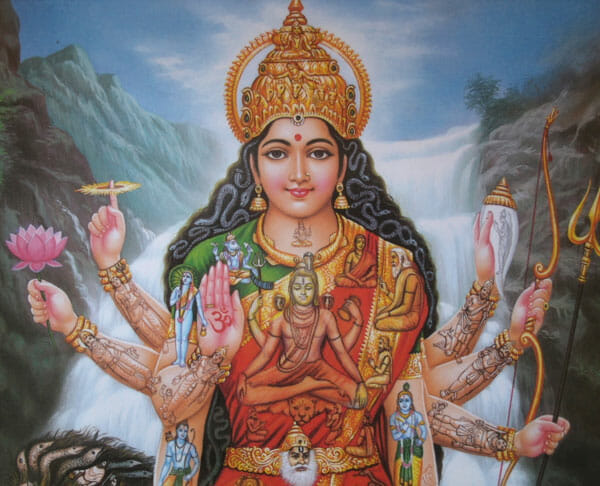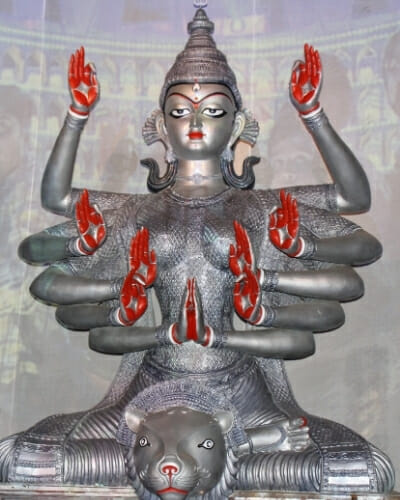Navaratri” means the nine nights and it’s a Hindu festival to celebrate the different forms of the Goddess Durga for nine days ( Navdurga).
It’s a celebration of the Divine Mother, and the love, abundance, and protection she offers us.
Devi, Goddess, Shakti, Divine Mother, Durga, the many forms—these all represent the dynamic and fluid feminine power that flows through and enlivens all of creation.
Each year, on each day of Navratri, an incarnation of “Goddess Durga” is worshipped to celebrate the day of her victory over Mahishasura, and the ultimate victory of ‘Good over Evil.”


Durga helps us to destroy and remove negative tendencies in our minds and hearts, freeing us from the impurities that create obstructions in our spiritual and material lives.
In some traditions, the first three nights of worship are dedicated to Durga (the invincible), the next three to Lakshmi (goddess of prosperity), and the last three to Sarasvati (goddess of learning).
Lakshmi helps us to cultivate positive qualities, like compassion and devotion, leading us towards both spiritual and material prosperity.
Sarasvati assists us in attaining knowledge and wisdom, through the illumination of consciousness.
She relates to prana, the vital breath, and sattva, the quality of purity. Through our devotion, service, practice, study, and meditation, we allow prana to flow freely and enter a state of peace, bliss, and oneness.
During the 9 days of Navaratri, one can also celebrate each day as the different phases that a woman goes through during her life:
-
Day 1 the first manifestation of Goddess Durga is celebrated as Shariputra, the daughter of the Himalayan mountains (better known as Parvati). So this is the daughter phase which is celebrated on day 1.
-
Day 2 she is honored as Brahmacharini, which is the study and apprentice phase.
-
Day 3 is as Candraghanta, which is the one who wears the moon as an ornament on her head and symbolizes the phase of finding a partner and getting married.
-
Day 4 is dedicated to Kushmanda which means pumpkin, so it is the phase of pregnancy.
-
Day 5 is dedicated to Skandamata, mother of Skanda, thus the mother phase.
-
Day 6 is dedicated to Katyayani which means warrior and is the form where she defeats the demon. Typically the mother who protects her child and who also calls you when you are in need.
-
Day 7 is Kalaratri which means “dark night” and symbolizes death, the hour of death. This can mean physical death but can also be a spiritual death such as letting go of all daily worries and dedicating yourself more to your spiritual life.
-
Day 8 is dedicated to Maha Gauri, the great radiant goddess. She is the personification of wisdom, happiness, and well-being, grounded in your ultimate Higher Self!
-
Day 9 is Siddhidatri, the giver of all Blessing and special powers!
The last day of Navaratri is celebrated in a big way, where the Goddess has won the battle of good over bad and a deep transformation has taken place.

PERSONAL PRACTICE FOR NAVARATRI
Though it is great to reduce our workload and gather with the community at local temples or places of worship when possible, we can also create a space at home and perform some personal practices to celebrate Goddess energy. Here are some ideas to do at home.
Create a sacred space, Durga altar, or Goddess altar. Even if you already have one, you can freshen it up or rearrange it specifically for Navaratri. Include images or statues of the Goddess(es) you have a relationship with, perhaps following one of the groups of forms above.
Even if you don’t have much time, dedicate at least a few minutes each day to connecting with Devi in front of your altar.
Offer light so that Goddess’s power may be illuminated and shine into the world and your life. This can mean lighting a candle by the altar when at home, or even an electronic tealight can be used symbolically.
Chanting of the Devi Mahatmyam, a verse to the Goddess is a common practice during the nine nights. You can also chant other Goddess mantras or songs that are special to you and your relationship with Devi.
If you would like to receive some special Durga mantras that I like to sing send an email to tara@sunfoodyoga.nl and I will send you text and songs in mp3 format.
Namaste Tara
